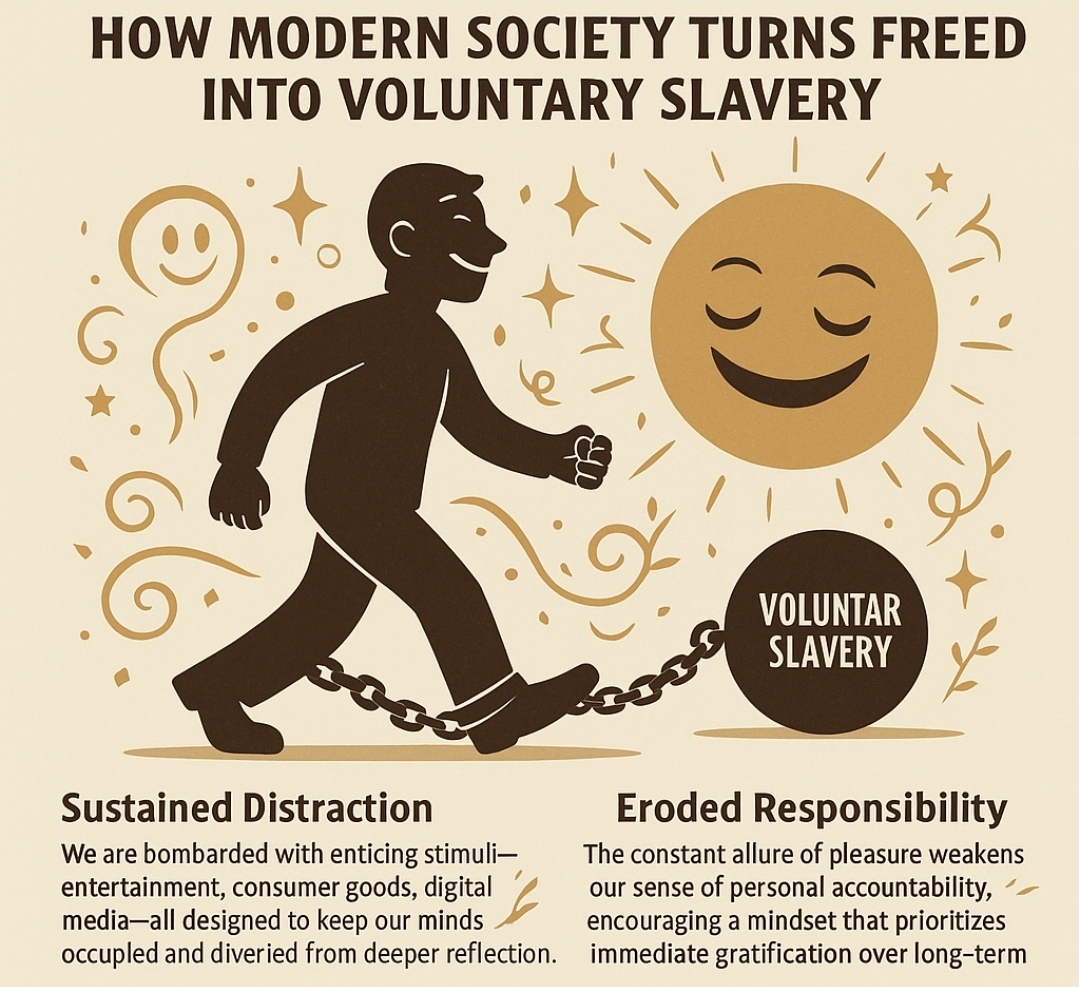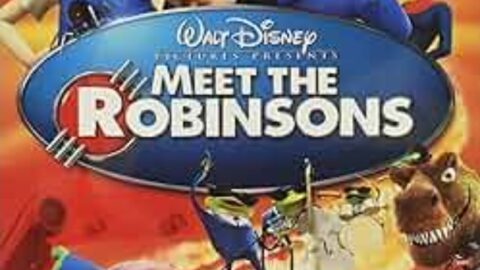Are You Truly Free?
Ask yourself carefully: are you free?
Most people’s day begins the same way. They reach for their phone before even taking a breath of fresh air. They scroll, searching for novelty, a shot of stimulation to jumpstart the day. Coffee, music, podcasts, newsfeeds—distraction upon distraction. And when silence arrives, it feels uncomfortable, even unbearable. That discomfort sends them searching for yet another quick fix.
This cycle of distraction is no accident. It is the architecture of modern captivity.
The Cage of Instant Gratification
Pleasure itself is not the enemy—it is a tool built into human nature, a compass guiding survival. But when that compass malfunctions, when pleasure becomes constant and compulsory, it turns into the bars of a prison cell.
Discomfort arises ‐ we escape it – relief comes – discomfort returns. And so the loop continues, binding us not with chains but with cravings.
Orwell vs. Huxley: Two Visions of Control
George Orwell warned of authoritarianism in 1984—a society crushed by repression, surveillance, and force. Aldous Huxley, in Brave New World, foresaw something more subtle and far more effective: a world where citizens love their servitude, too entertained and too anesthetized to even consider rebelling.
Look around. Which vision describes us today?
Slavery Through Pleasure
The most effective slavery doesn’t require torture, surveillance, or police states. It requires only one thing: pleasure.
A world drowning in entertainment, shallow consumption, and endless distraction convinces people that they are free—even as they submit to the invisible leash of instant gratification.
Conditioning in the Modern World
This is not an accident of culture—it is conditioning.
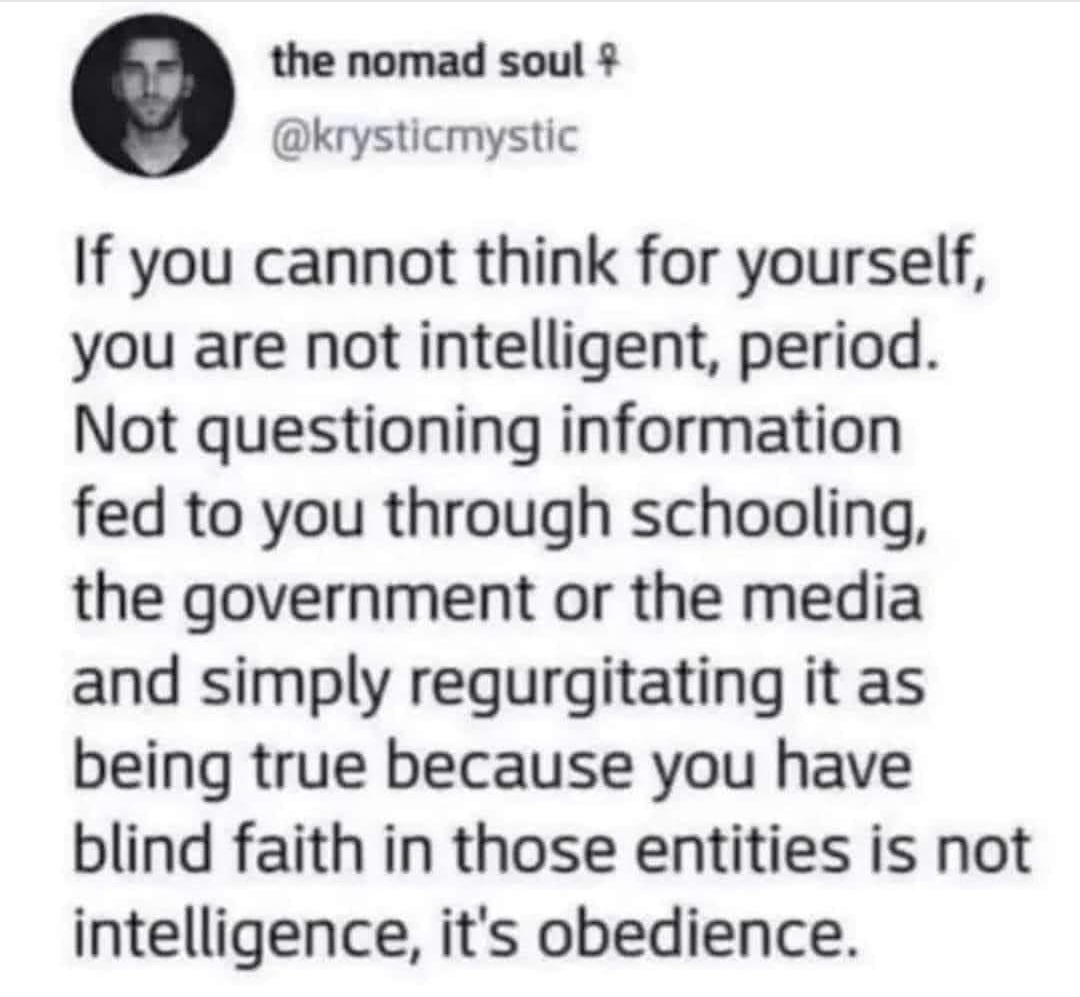
- Education teaches memorization, not critical thought.
- Employment trains workers for productivity, not reflection.
- Media and algorithms flood attention with stimuli, eroding the capacity to pause or question.
Like Huxley’s sleep-learned slogans, today’s “programming” arrives through feeds, notifications, and marketing campaigns. Slowly, people internalize the belief that happiness equals consumption, and that freedom means the absence of discomfort.
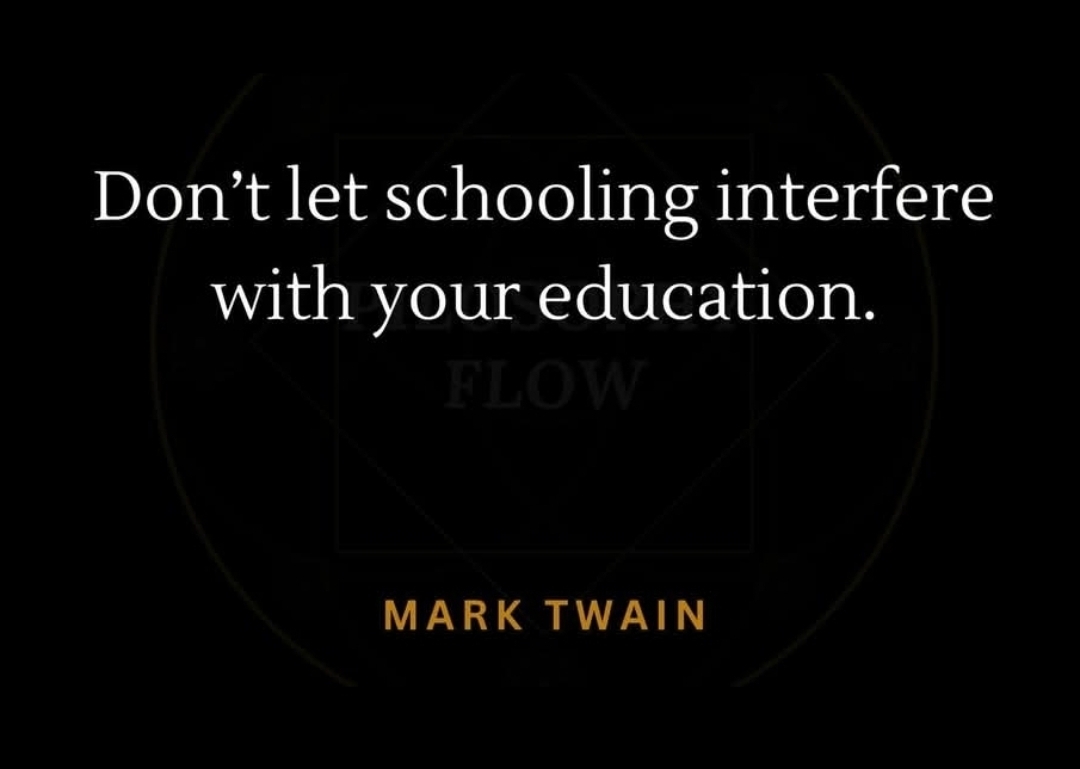
Fragility in the Age of Comfort
A life without pain sounds like paradise. But when suffering is always avoided, the result is fragility.
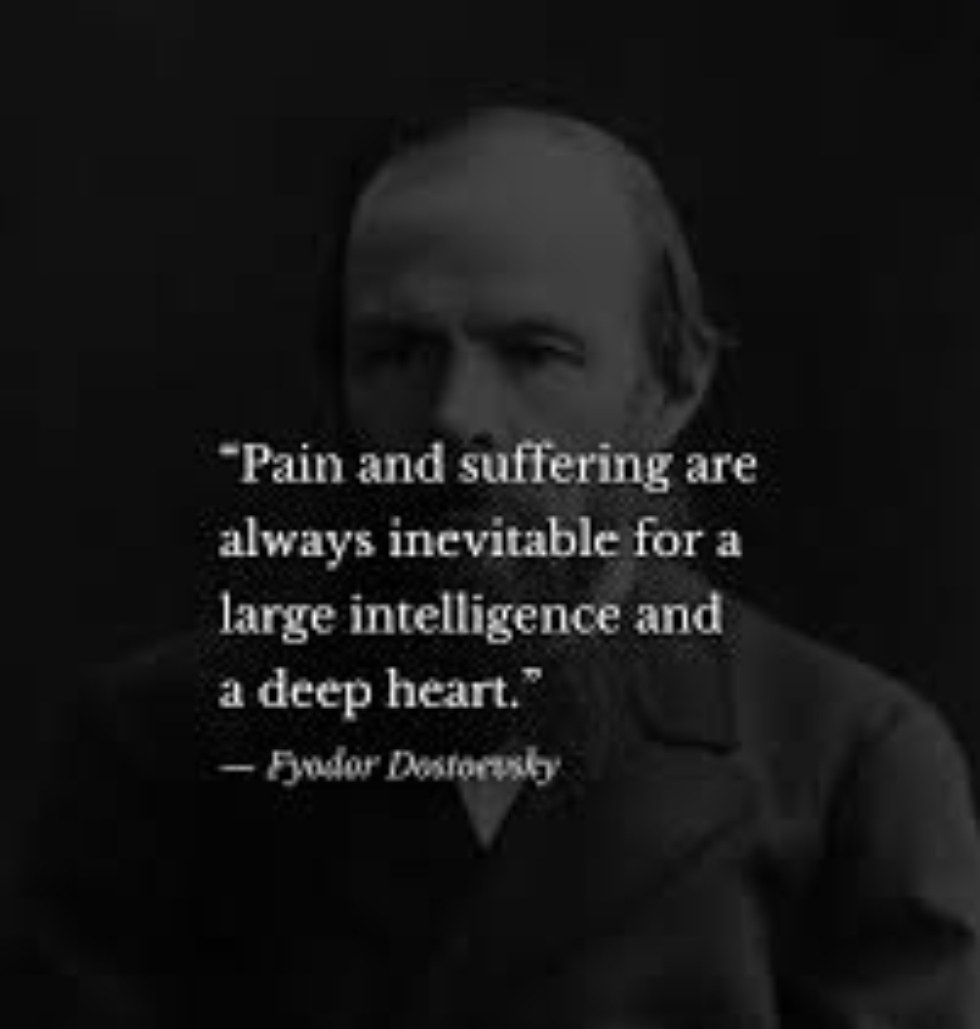
Without struggle, there is no resilience. Without discomfort, there is no growth. The avoidance of hardship produces individuals who collapse at minor setbacks, who view small failures as catastrophes, who discard patience, endurance, and discipline for quick dopamine hits.
Modern soma isn’t a pill—it’s social media, pornography, shopping, junk food, alcohol, binge-watching. And just like Huxley’s citizens, we love the very substances that keep us docile.
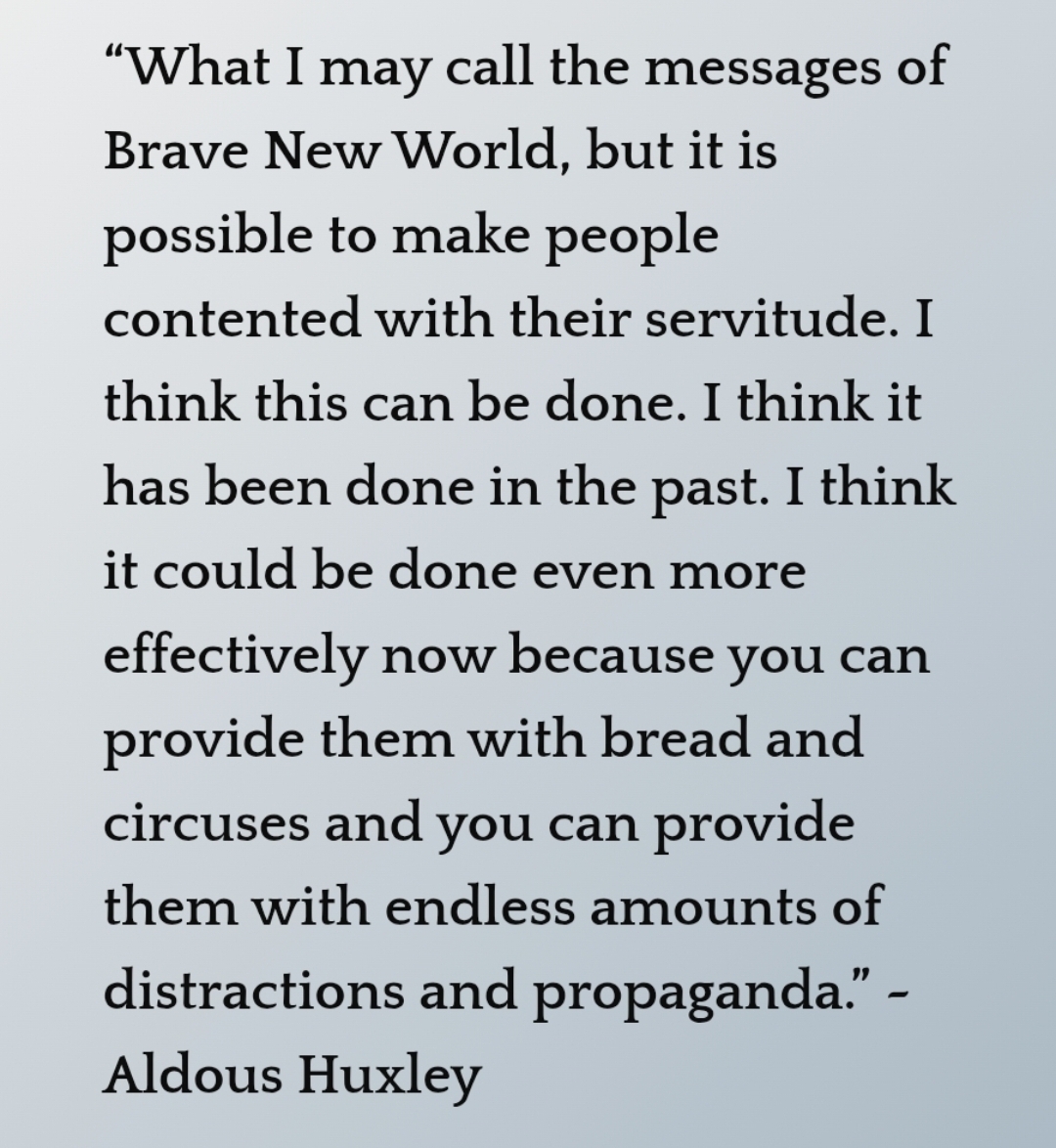
Why Pain Has a Purpose
Pain, frustration, and discomfort are not enemies—they are teachers.
- Suffering builds resilience.
- Frustration trains patience.
- Difficulty forces growth.
By erasing these lessons, society produces weaker individuals—easier to manipulate, easier to pacify, easier to control.
Escaping the Pleasure Trap
Breaking free requires conscious, intentional steps:
- Strategic deprivation of pleasure – regulate addictive stimuli and let your brain recalibrate.
- Rebuild tolerance for discomfort – sit with silence, boredom, and restlessness until they lose their power.
- Cultivate critical thinking – ask who benefits from your distractions and your consumption.
- Replace shallow pleasure with deep purpose – pursue meaning instead of novelty.
The Cost of Freedom
Freedom is not easy. When you step away from distraction, people will notice. Some will admire your courage. Others will reject you, because your clarity exposes their illusions.
But this is the price of sovereignty. To walk away from distraction is to reclaim your mind, to live with purpose rather than pacification, to choose meaning over manipulation.
The Choice Before You
You can remain in the loop—scrolling, consuming, numbing—believing yourself free while living as a happy servant.
Or you can stop. You can endure discomfort, embrace silence, and build a life with purpose.
True freedom is not comfort. True freedom is the courage to seek meaning.
Here’s a point-by-point breakdown:
1. The Illusion of Freedom
- Opening question: “Do you believe you are truly free?”
- Immediately challenges daily habits: first thing in the morning, most people reach for their phones.
- Highlights how our lives are built on constant distraction and novelty seeking.
2. The Cycle of Instant Gratification
- Pleasure itself isn’t the problem—it’s meant to guide survival.
- But when pleasure becomes constant and compulsive, it transforms into a cage.
- The endless cycle: discomfort → distraction → temporary relief → return of discomfort.
3. Huxley vs. Orwell
- Orwell (1984): control by overt repression, surveillance, and fear.
- Huxley (Brave New World): control through entertainment and overstimulation.
- People don’t resist because they love their distractions, their servitude.
4. Pleasure as Control
- Society today mirrors Huxley more than Orwell.
- Entertainment and comfort are positioned as freedom—but actually keep people docile.
- “The perfect slavery requires no chains—only pleasure.”
5. Conditioning and Habits
- Daily micro-behaviors (scrolling, shopping, streaming, gaming, casual sex, etc.) reinforce the cycle.
- It feels voluntary, but is actually conditioning.
- Algorithms and constant stimuli slowly erode the ability to sit in silence or reflect deeply.
6. Social Programming
- Schools: emphasize memorization over critical thought.
- Jobs: train people for production, not reflection.
- Culture: bombards with entertainment to block questioning.
- The result: people stop even wanting freedom.
7. Hypnopedia and Algorithms
- Huxley’s “sleep-learning” vs. today’s algorithms.
- Instead of whispered phrases at night, our subconscious is programmed by endless feeds, ads, and dopamine hits.
- Likes, notifications, and social validation reinforce conformity.
8. Fragility Through Comfort
- Imagining a world without pain sounds good—but it weakens individuals.
- When challenges are removed, resilience disappears.
- Even small setbacks feel catastrophic when we’re conditioned for constant ease.
9. The False Paradise of Soma
- In Brave New World, people take “soma” to avoid discomfort.
- Today, soma exists in the form of social media, processed foods, entertainment, pornography, alcohol, etc.
- Society avoids pain instead of facing and learning from it.
10. The Purpose of Pain
- Pain and discomfort have meaning: they build resilience, patience, creativity, and growth.
- By erasing them, modern society makes people fragile and easier to control.
11. The Path Out
Four main strategies are offered:
- Strategic deprivation of pleasure – regulate exposure to addictive stimuli.
- Rebuild tolerance for discomfort – relearn to sit in silence, boredom, and stillness.
- Cultivate critical thinking – ask who benefits from your distractions and consumption.
- Replace shallow pleasure with deep purpose – shift from dopamine hits to meaning-driven living.
12. Resistance and Isolation
- When you change, others will notice.
- Some will admire you; others will reject you because your new clarity threatens their illusions.
- Freedom often comes with loneliness and resistance.
13. The Choice
- You can stay in distraction, chasing dopamine and numbing the void.
- Or you can face discomfort, seek purpose, and free your mind.
- Real freedom is not comfort—it is choosing purpose over shallow pleasure.

